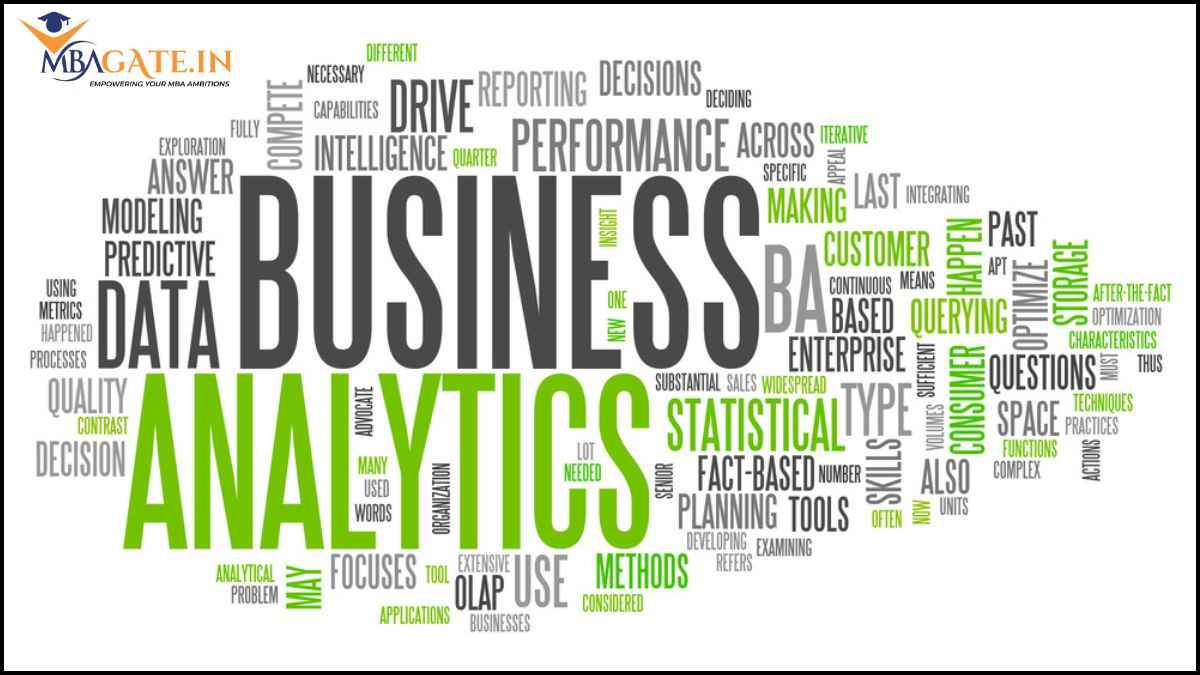MBA in Business/Data Analytics
Table of Content
-
- + more items Show less
It educates students on how to gather, organise and analyse data. They are shown how to utilise tools and software like Excel, SQL, Python, R and Tableau. They also learn statistics, data visualisation, machine learning basics and forecasting analytics. The training emphasises technical as well as management skills, enabling students to become data leaders.
The program normally takes two years and is provided by some of the premier business schools. It is also available as a one-year course in some colleges for working professionals. Any student from any background (science, business or engineering) can enrol in this degree as long as they fulfill the eligibility criteria and clear tests like the CAT, XAT and GMAT.
One of the greatest benefits of earning an MBA in Data Analytics is the wide variety of job opportunities it opens up. Graduates may become data analysts, business analysts, data scientists, marketing analysts, operations analysts and others. These jobs are in high demand in a wide range of industries, such as finance, healthcare, IT, retail, consulting and e-commerce.
Recruiters like Amazon, Google, Accenture, TCS, Deloitte and Infosys prefer to recruit MBA graduates with data analytics qualifications. The salaries are also good, based on the abilities and experience of the candidate and the institute that awarded the MBA.
Apart from technical expertise, students acquire skills like critical thinking, problem-solving, decision-making and communication, which are essential for business leadership positions.
Highlights
An MBA in Data Analytics is a two-year postgraduate degree program that integrates business management and data science. It teaches data analysis technologies such as Excel, Python, R, SQL and Tableau and statistics, business intelligence and decision-making. The course prepares students for careers as data analysts, business analysts and data scientists in fields such as IT, finance, marketing, healthcare and e-commerce. Admission is typically obtained through tests such as the CAT, XAT or GMAT and graduates are in high demand by major corporations such as Google, Amazon, Deloitte and Infosys.
What is an MBA in Data Analytics?
An MBA in Data Analytics integrates the technical skill of data analysis with business administration, knowing how to make decisions based on data within a fast-evolving corporate environment. The curriculum of the program encompasses key fields such as data management, statistical modelling, machine learning and data visualisation, in addition to leadership, decision-making, and strategic thinking. Students in this two-year postgraduate course become skilled in diverse analysis tools. An MBA in Data Analytics for Working Professionals can analyse complex data, identify useful information and implement data-driven solutions to enhance the productivity of a company. An MBA in Data Analytics opens career prospects in diverse fields such as consulting, marketing, healthcare and finance, where data is increasingly being utilised to drive business growth and inform business decisions. This is achieved through the integration of analytical techniques with business strategy. Business information security, big data, cloud computing, predictive analytics, e-business, data visualisation and decision-making systems, marketing analytics with Pytho, and data science are among the courses offered in this programme.

Why should one choose an MBA in Data Analytics?
At present, Indian industry provides great job opportunities for an MBA in Data Analytics. Graduates are often hired by outlets in the media, information technology, insurance and banking sectors to manage their data services and global companies in their insurance units. The program would equip students with a basic knowledge of several data and insurance-based subjects and exposure to a variety of global financial competitions.
An MBA in Data Analytics brings out the strengths of both streams, a typical MBA program curriculum augmented with electives dealing with data analytics. While the data analytics concentration will familiarise students with topics like predictive analytics and employing artificial intelligence for data mining, the core MBA courses will concentrate on imparting practical skills in project management and other business administration techniques.
Candidates typically seek positions as business analysts, data consultants, risk analysts, data scientists, data engineers, and healthcare data analysts. In addition to these options, students can search for jobs at reputable universities as professors or lecturers.
Who should choose an MBA in Data Analytics?
An MBA in Data Analytics is perfect for business students or professionals who wish to learn general business and advanced data skills. Such a degree might be a great option for IT professionals, marketing managers or business analysts. These IT professionals are required to make strategic, data-driven decisions. Data-driven innovations, process optimisations, or enhanced customer experience will greatly benefit leaders seeking to launch them. It is also a good option for engineering, finance and technology students who wish to move to leadership positions in analytics industries. It is also open to entrepreneurs who have to employ data to establish their companies in an effective way. These days, businesses are surviving on data. This industry offers good career opportunities for those who have a high level of mathematical skills, accounting skills and Python programming skills. This program will benefit students who have learned computer science and programming languages. Students who want to work in management and apply their Python skills are best suited for this profession. This will assist those who are good at dealing with complex, raw and unstructured data and those who like working with numbers. Predictive modelling, data visualisation tools and coding skills are all crucial.
Eligibility Requirements
Applicants should score at least 50% (45% for SC/ST) in the qualifying exam. Students who wish to secure admission while preparing for final year exams may submit a provisional degree accompanied by necessary documents.
A relevant experience can assist students to get the required information while on course but is not a must. Few institutions and universities have requirements that mandate at least a year of relevant experience. Experience is necessary in understanding management studies. It can also assist individuals to sharpen their talents in readiness for further developments.
Entrance Exam
National-level entrance tests are the major avenue of entry to MBA courses of data analytics. Popular tests are CAT, XAT, GMAT, MAT, CMAT and NMAT. These tests test numeric aptitude, logical reasoning, data interpretation and verbal ability. The marks are used by different business schools to shortlist candidates for further rounds like group discussions, personal interviews, and written ability tests. A good entrance test score boosts your chances of getting admitted into top-ranked universities offering MBAs in Data Analytics.
Admission Process
Ensure you hold a bachelor's degree (in any discipline) with the minimum marks required (usually 50% for general and 45% for reserved categories).
Appear for the requisite entrance examinations, like CAT, XAT, GMAT, CMAT, MAT or NMAT, as recognised by the institution.
Fill out the application forms of universities offering MBAs in Data Analytics, along with your admission test scores.
Colleges shortlist candidates on the basis of admission test scores and academic records.
A WAT, PI and GD are required of shortlisted candidates.
Final choice depends on overall performance, which comprises the entrance test score, GD/PI/WAT, academic performance and work experience (if any).
Candidates chosen receive an offer letter of admission; they need to accept admission by paying the charges.
Classes generally commence once admission is confirmed, as per the institute's academic calendar.
MBA in Data Analytics Syllabus
There are a few similar subjects that are covered in the two-year MBA Data Analytics course, even though the topics vary from college to college. The following are some of the most popular and frequently taught subjects in this course at most universities:
Colleges with specialisations in Data Analytics/ Specialised PGDM/MBA in Data Analytics- Fees
The following universities are the best for an MBA in data analysis as per the NIRF Ranking. The table showcases high-profile private institutions that provide two-year MBA and PGDM courses for those who want a career in data analytics, e.g., Symbiosis Institute of Management and Great Lakes Institute of Management. The chart can be referred to by students interested in this program to find more colleges.
Colleges with specialisations in Data Analytics/ Specialised MBA/PGDM in Data Analytics: Average Package
According to NIRF, the universities listed below are the best private and public universities offering a specialised MBA in Data Analytics degree. The program focuses mostly on data management, preparing students to forecast market trends and make data-driven decisions. The average course package from each college is highlighted in the table along with the course duration.
|
College Name
|
Program Name
|
Duration
|
Average Package
|
|
SIBM-Symbiosis Institute of Business Management, Pune
|
MBA
|
2 Years
|
₹ 25.0 Lakhs per annum
|
|
Great Lakes Institute of Management, Chennai
|
PGDM
|
2 Years
|
₹ 17.3 Lakhs per annum
|
| GIM—Goa Institute of Management, Goa
|
PGDM (Big Data Analytics) |
2 Years
|
₹ 17.02 Lakhs per annum
|
|
VITBS—VIT Business School, VIT Vellore
|
MBA
|
2 Years
|
₹ 9.9 Lakhs per annum
|
|
MSRIM—M. S. Ramaiah Institute of Management, Bengaluru
|
Part-Time Ph.D
|
4 Years
|
-
|
|
Symbiosis Centre for Information Technology (SCIT), College in Pune, Maharashtra |
MBA-DA
| 2 Years
|
₹ 11.16 Lakhs per annum
|
Jobs after MBA in Data Analytics
Students who engage in MBA Data Analytics courses have access to a variety of job options. Students who take the degree can find employment in a number of sectors, such as insurance departments, international organisations, IT and banking. At any respectable university or establishment, they can also serve as lecturers or professors.
MBA in Data Analytics Future Scope
With companies relying increasingly on data to inform decisions and drive growth, the prospects for an MBA in data analytics look favorable. As a result of the swift growth in big data, artificial intelligence, and machine learning, data analytics professionals are in strong demand in many types of companies. Data analytics-trained MBA graduates posses the technical and management skills to help decipher complex data and drive strategic solutions that raise productivity and profitability. MBA holders can reap much in terms of job opportunities from the increasing application of data-based business models across many industries, including marketing, e-commerce, healthcare and finance. As data protection and privacy evolve much beyond those times, companies will also require better human capital that can understand regulatory models. Since technology is constantly expanding, there will be greater opportunities for specialists in this area, like roles in data strategy, management and analytics leadership, which will fuel corporate innovation over the coming years.
Conclusion
An MBA in Data Analytics is a sought-after and emerging industry, with most companies seeking specialists and professional employees who can read and implement the data provided to inform profitable decisions. The course lessons educate students on how to obtain data, how to interpret data, and how to read data in the simplest manner. With these skills, the graduates can work in numerous industries, such as marketing, finance, healthcare, and technology. With these skills, graduates are employable in various industries such as marketing, finance, healthcare, and technology. They know how to solve real-world business issues using data. More and more companies depend on data to create and grow, so individuals with this MBA are sought after. It is a great choice for a successful career in the current digital and data age.
FAQs
For people who are math experts, data analytics provides utility and efficient communication value. Candidates graduating from this MBA program with a concentration in data science are ready for positions in public finance, risk management, brand management, strategic planning, and management consulting.
Getting an MBA in business Analytics teaches you to analyze collected data and convert it into useful knowledge that may have a direct influence on short-term as well as long-term decisions in the company. Therefore, business analytics can be applied to virtually every kind of business, and it offers ample scope for working people who get their MBA in business analytics.
MBA in Data Analytics salary in India usually earns between INR 6 LPA and INR 40 LPA. As a person obtains more expertise in their particular industry, their compensation may climb to the highest salary ₹ 35.92 Lakhs per annum.
Yes. The MBA Data Analytics entrance exam is not so tough. It will be easy for someone with any background to crack. Furthermore, the prime strategy of students to clear the entrance exam with flying colours is to prepare strategically and practice aptitude-based questions.









